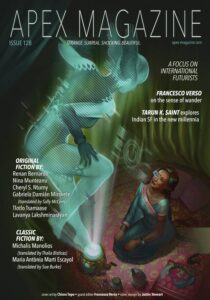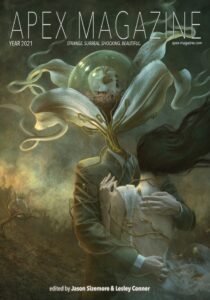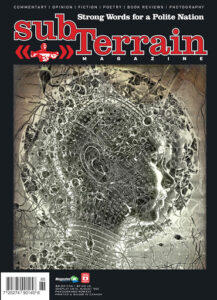Robin’s Last Song by Nina Munteanu
 I recently had the pleasure of talking with Canadian author Nina Munteanu about one of her latest projects. It’s all about birds, I’m told. Nina is an eco-fiction author of science fiction and fantasy with nine novels and five non-fiction books published, including Water Is… recommended by Margaret Atwood as her #1 choice in the New York Times ‘Year in Reading’ in 2016.
I recently had the pleasure of talking with Canadian author Nina Munteanu about one of her latest projects. It’s all about birds, I’m told. Nina is an eco-fiction author of science fiction and fantasy with nine novels and five non-fiction books published, including Water Is… recommended by Margaret Atwood as her #1 choice in the New York Times ‘Year in Reading’ in 2016.
Congratulations on publishing your short story Robin’s Last Song in Issue 128 of Apex Magazine and soon in the Apex Magazine 2021 Compilation Anthology. I’m curious about the title? Whose last song is it? Is Robin the name of a human or the bird?
Both, actually. The title is both literal and metaphoric. The premise of the story is based on the alarming trend of disappearing birds. The robin, a common bird in Ontario where the story takes place, is a good sentinel for what’s happening with bird populations around the world. Robin is also the protagonist’s name; she was named after the robin, her mother’s favourite bird.
Robin’s Last Song is obviously eco-fiction. What’s it about?
Robin’s Last Song first appeared in the #128 Issue of Apex Magazine in 2021. It tells the story of Robin, a blind elder whose digital app failed to warn the world of the sudden global loss of birds with disastrous ecological consequences. After years of living in self-exile and getting around poorly on sight-enhancing technology, a discovery gives her new hope in rekindling her talents in the field of Soundscape Ecology.
How did you come to write this particular story about birds and what is soundscape ecology?
Since I was a child, the burgeoning SF writer in me had dared to imagine a world without the sound of birds—I thought it utterly bleak and, recognizing an ever-polluting world, I feared for my feathered relatives. I didn’t follow through with a story until September 2019, when I was approached by Oliver Hockenhull, the guest editor of subTerrain Magazine, to write a piece on technology and the environment. The timing was interesting; I’d just read two impactful things that resonated with me.
 The first was the October issue of Science Magazine that reported a staggering decline in North American birds. Kenneth V. Rosenberg and his team of researchers had estimated that three billion birds of various species had disappeared in Canada and the United States since 1970. That’s a third of the entire bird population lost in five decades. To make it clear, we aren’t talking about rare birds going extinct; these declines are of common birds throughout the world. The wrens, sparrows, starlings, and, of course, the robins. I was devastated; I couldn’t imagine a world without the comforting sound of birds. What would it be like if the birds all disappeared? This brought me back to my childhood fears.
The first was the October issue of Science Magazine that reported a staggering decline in North American birds. Kenneth V. Rosenberg and his team of researchers had estimated that three billion birds of various species had disappeared in Canada and the United States since 1970. That’s a third of the entire bird population lost in five decades. To make it clear, we aren’t talking about rare birds going extinct; these declines are of common birds throughout the world. The wrens, sparrows, starlings, and, of course, the robins. I was devastated; I couldn’t imagine a world without the comforting sound of birds. What would it be like if the birds all disappeared? This brought me back to my childhood fears.
The second article I ran across talked about an emerging bioacoustics tool, soundscape ecology, that measures biodiversity and the health of an ecosystem, mostly through bird sound, which well represents ecosystem health. Bernie Krause, a soundscape ecologist who had been conducting long-term recordings for decades, noted how the dawn chorus in many areas had greatly diminished if not vanished altogether.
I now had my premise and my connection with technology. The title of my original story for subTerrain was Out of the Silence. This story focused on the technical aspects of the premise and solution. When I was approached for a story in February 2021 by Francesco Verso, the guest editor of Apex Magazine Issue #128, I rewrote the story with a stronger focus on the protagonist’s personal journey and connection with the bird catastrophe, how she coped with Asperger’s syndrome and the failure of her tool to predict the disaster. Hence the change of the title to Robin’s Last Song.
Without wanting to bring in spoilers, isn’t there a twist to the story, suggesting a cautionary tale that touches on the dangers of genetic engineering?
 Yes, thanks for bringing that up. I was already primed with research into genetic engineering for the sequel to my 2020 eco-novel A Diary in the Age of Water. I wanted to make the bird disappearance in Robin’s Last Song into a dramatic catastrophe linked to our own dangerous ecological tampering. I had the notion of using a gene-hacking disaster to create ecological calamity and how this might affect birds. I wanted to make Robin’s Last Song a realizable work of fiction in which science and technology play both instigator of disaster and purveyor of salvation. Our biogenetic technology comes to us as a double-edged sword in the form of gene-editing, proteomics, DNA origami, and CRISPR—just to name a few. These biotechnological innovations promise a cornucopia of enhancements: from increased longevity and health in humans to giant disease-resistant crops. But, for every ‘magic’ in technology, there is often unintended consequence. Unforeseen—or even ignored—casualties and risks. I suppose my ultimate question with this story is: will synthetic biology redesign Nature to suit hubris or serve evolution? Science doesn’t make those decisions. We do.
Yes, thanks for bringing that up. I was already primed with research into genetic engineering for the sequel to my 2020 eco-novel A Diary in the Age of Water. I wanted to make the bird disappearance in Robin’s Last Song into a dramatic catastrophe linked to our own dangerous ecological tampering. I had the notion of using a gene-hacking disaster to create ecological calamity and how this might affect birds. I wanted to make Robin’s Last Song a realizable work of fiction in which science and technology play both instigator of disaster and purveyor of salvation. Our biogenetic technology comes to us as a double-edged sword in the form of gene-editing, proteomics, DNA origami, and CRISPR—just to name a few. These biotechnological innovations promise a cornucopia of enhancements: from increased longevity and health in humans to giant disease-resistant crops. But, for every ‘magic’ in technology, there is often unintended consequence. Unforeseen—or even ignored—casualties and risks. I suppose my ultimate question with this story is: will synthetic biology redesign Nature to suit hubris or serve evolution? Science doesn’t make those decisions. We do.
Tell us a little bit about the Apex Magazine 2021 Compilation Anthology. When is it coming out and where can people get it?
The anthology is due sometime in August 2022 and will be in both print and digital versions. The more than 350-page anthology will compile all original short stories published in Apex Magazine during the 2021 calendar year. Published through Apex Book Company, it will feature forty-eight stories from a diverse group of new and established writers and the cover will feature award-winning artwork “Entropic Garden” by Marcela Bolivar. Check this link for more about the anthology and where to get it.
Are you still coaching writers and such?
Yes, I am, Simon. Did you know that I’ve been coaching writers to publication for close to twenty years? When I’m not teaching writing at the University of Toronto or George Brown College, I help writers with craft on their novels and short stories through my coaching services. You can find out more at: www.NinaMunteanu.me.
Tell us a little about any writing projects you’re working on these days.
I’m always busy with science articles for various online and print magazines and my own blogs. I’m also currently finishing a speculative eco-fiction novel that is a loose sequel to A Diary in the Age of Water. It’s set throughout Canada, from the Maritimes to the Arctic Circle, and spans a wide timeline from the Halifax Explosion of 1917 to the vast NAWAPA reservoir created a century and a half later by drowning British Columbia’s Rocky Mountain Trench. It’s a fast-paced thriller that focuses on four homeless people who battle corporate intrigue, kidnapping, human experiments and a coming climate plague.
Thanks, Nina, for being my guest here today. Best of luck with Robin’s Last Song and your other projects.
You can learn more about Nina and her work on her various websites: www.ninamunteanu.ca for her writing; www.ninamunteanu.me for her coaching and writing advice; and www.TheMeaningOfWater.com for her environmental articles and anything to do with water.



